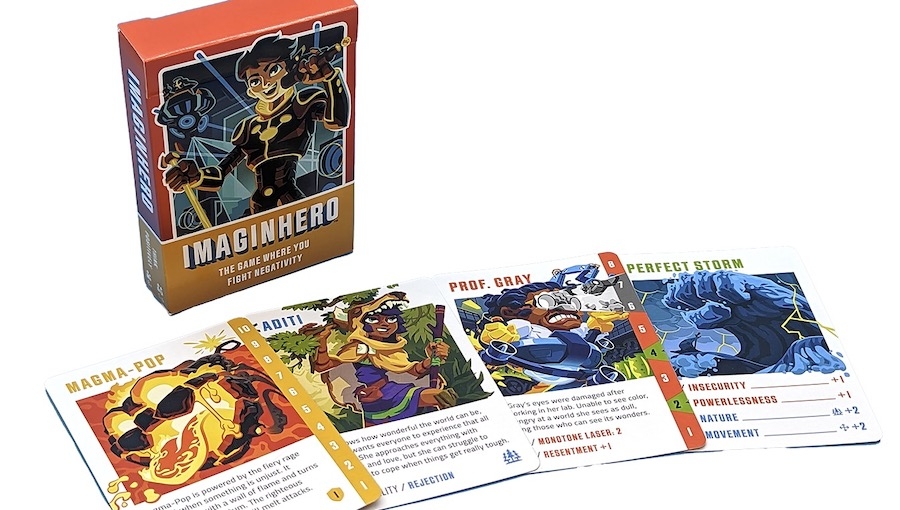The following is an interview with Stuart Inskip regarding the recent release of the card game, Imaginhero™. In this interview, Fanbase Press Editor-in-Chief Barbra Dillon chats with Inskip about the inspiration behind and creative process for bringing the game to life, what he hopes that players, educators, and mental health professionals will take away from the project, and more!
Barbra Dillon, Fanbase Press Editor-in-Chief: Congratulations on the recent launch of Imaginhero™! For those who may be unfamiliar, what can you share with us about the premise of the gaming system?
Stuart Inskip: Imaginhero™ is a card game that’s like Pokémon for positive mental health. When monsters lash out and overwhelm one of your team, you deal your character a superpower to battle with and use your shield to protect from their negativity-charged attacks.
The gameplay of Imaginhero is built on underlying principles of cognitive behavioral therapy (CBT). Each part of the game works to instill patterns of positive thinking, develop empathy, and visualize new approaches to stress.
BD: How would you describe your creative process of designing and creating the game while also allowing it to function as a therapeutic tool?
SI: The concept of using “mental health superpowers” to save a friend was a core idea from the beginning. As each new gameplay element was added, we ensured it carried a kernel of therapy. The monstrous Echo cards, for example, have Pain points, a measure of the emotional pain we feel from excessive negative thoughts. And the powers have Empathy points, because you can’t help someone in pain without having empathy for them.
The look of the game was incredibly important, and I was lucky to work with the immensely talented David Lantz, who took the characters and gave them a life beyond anything I could have dreamed. He created beautiful original artwork for each card that exemplifies the concepts behind the cards, both the good and the bad, and they immediately draw the player into the world. For each card, we worked through several concepts to really strike on designs that are fun, energetic, and – where necessary – just a little dark.
BD: Did you have a specific mission in mind – in terms of the user’s experience – when crafting the game?
SI: I’ve been creating mental health therapy tools, such as Cards for Calm, since 2017, and my goal is to help people find better ways to deal with negativity and anxiety. With Imaginhero, I wanted to create something to help people whether or not they have access to therapy.
We wanted to create a game that players, particularly younger players, would enjoy. If they’re having fun, then the ideas and techniques layered within will slowly be discovered.

BD: What can players anticipate about the resources and tools available within the deck of cards?
SI: A fundamental concept of the game is that negative thoughts can happen to anyone, but so is having the power to help. You play as one of 12 characters, any of whom can be a hero or can be overwhelmed by negativity.
When a character is overwhelmed, they are captured by one of the Echo cards. The Echoes are personifications of entrenched patterns of negative thinking; they’re a monstrous example of what can happen if someone becomes consumed by an unhealthy pattern of thinking.
To rescue this character, players equip their hero with a Power card. Each power represents a healthy way of thinking about a challenging or stressful situation. To use your power, you roll a die, an octagonal shape folded from a special card in the deck.
Echoes have different sources of negativity (such as entitlement or resentment) that affect some characters more than others, and different powers are more effective against Echoes of different sources. Combine these with the trigger cards, and no two rounds are ever the same.
BD: Do you feel that this gaming system will be accessible for both card game fans and/or professionals within the mental health community (who may want to add the game as a resource within their practice)?
SI: This was really important to me. Previous tools I’ve created are used by educators and mental health professionals. I wanted Imaginhero to be another tool for them, but also to be an enjoyable game for players unfamiliar with mental health practices.
We’ve found that children are excited by the characters and artwork, and enjoy discussing them even outside of the game. This makes them ideal to begin conversations about experiencing patterns of negative thinking, whether in an educational or clinical setting, with their parents, or with their friends.
BD: Are there any other projects on which you are working that you would like to share with readers?
SI: We have an Imaginhero app coming very soon. Players will be able to use this to enhance different aspects of the card game, and it will grow to include other resources that encourage people to care for their mental health.
We’ll be releasing a workbook for parents, therapists, and educators to discuss the game’s concepts with kids. And we’re also planning an expansion pack that will expand the gameplay, introduce more characters and powers, and even more ways to think positively.
BD: Lastly, what would you like to tell fans who want to learn more about the Imaginhero™?
SI: They can find everything they’d like to know about the game at imaginhero.com. It’s also available on Amazon and, soon, from Walmart.
For anyone looking for advice on how to manage their own mental health, how to help a friend, or how to get resources for their school, I’d recommend Lady Gaga’s Born This Way Foundation as a great place to start.
And for anyone who has more immediate concerns, the SAMHSA National Helpline is a free, confidential, 24/7 mental health info service in both English and Spanish. Their number is 1-800-662-HELP (1-800-662-4357). Or they can text the Crisis Text Line on 741741, who also have chat available on their site and WhatsApp.

